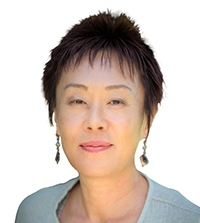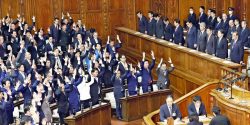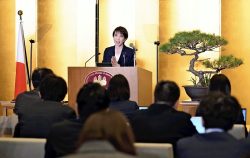9:30 JST, June 16, 2022
Buffalo, New York, and Uvalde, Texas — two very different places in two corners of the United States. One carefully planned attack against racial “others” vs. two violent outbursts, first at home and then in school, directed at one’s own. Two 18-year-olds known as “loners,” armed with AR-platform rifles and loads of ammo, all legally obtained. Through tragic losses, trauma and grief, one question looms large: what insanity is it for a society to allow teenagers to get hold of such powerful weapons with relative ease?
“I can’t stand this anymore!” One of my friends spits out the words as though to get rid of something foul-tasting from her mouth. My friends and I are sitting over our Friday afternoon cocktails at a local hangout just a few days after the Texas mass shooting took place. One shooting is bad enough, but coming right on the heels of another 10 days prior in New York, the shock is all the more intolerable. A cacophony of anger and frustration is directed less at the teenage boys, so immature that they could only express their pent-up anger in this destructive way, but more toward the system that practically places deadly weapons in their hands. “We’ve got to have real gun control,” another friend demands. “Most Americans want that, even the majority of the NRA members want that.”
The people around the table — except for myself — are all well-educated white American women and self-acknowledged liberals of the boomer generation. They believe that many systemic issues in this country — including the lack of effective gun control — remain unresolved because of the conservatives, who wield their political power to block any attempt for progressive change. My friends would be happy to see much more restricted gun ownership; happier, probably, to ban all firearms if they could.
I grew up in Japan, which is considered to have the toughest gun control in the world. I had never seen guns and believed they were dangerous. I never imagined myself handling, let alone shooting a gun ever, until Art, a college friend, took me out for target practice. He told me that he grew up on a ranch in Montana, and that guns were, just like a saddle or a shovel, an essential tool for the livelihood of a rancher. It was a new and strange idea that a gun could be a daily necessity for some people, which stuck with me for all these years.
As I listen to my friends, I try to think what Art would say about this. A gentle and kind soul, he’d be just as sad and upset about the mass shootings as anyone else. But, I imagine, he wouldn’t be angry at the guns. He’d say that it’s not a tool’s fault if someone misuses it to hurt other people. He would also say that adults should have taught those boys early on what guns are for, and not for, and how to use them and take care of them properly. He might even say that, if everyone around the teenage shooters owned and knew how to use guns, maybe they would be able to protect themselves when things went wrong. These are views typically associated with conservative politics, but for Art and many other Americans like him, it’s not just a political position. It’s wisdom grounded in generations of experience making a tough living in the country.
So I decide to venture into the heated conversation around the cocktail table. I understand the sentiment behind the cry for gun control — we need something concrete, something manageable, to direct our anger at during the moments of collective dismay. I also support thoughtful policies and programs to regulate access to dangerous firearms. But, in most states, there are regulations on gun ownership already. But if someone is determined to cause harm (think of the Akihabara massacre, for example), is there any regulation strict enough to keep them away from every possible weapon? Is it really the guns we ought to focus on? Shouldn’t we be asking the other, more fundamental question: What motivated these teenagers to want to cause such destruction to begin with?
Everyone falls quiet. After some uncomfortable shuffling, the conversation moves on to our gardening exploits.
The truth is, we have known the answer to that question for over two decades. Teenage shooters since the Columbine High School massacre (1999) all exhibit signs of profound alienation: known “loners” who are disengaged from school activities, lacking emotional connection to their families and leaning toward extreme views. The two most recent incidents are no exception. Buffalo, NY, shooter Payton Gendron showed up to school in a hazmat suit; Salvador Ramos of the Uvalde, TX, shooting was bullied as a child and dropped out of high school during the pandemic. A succession of analyses have pointed out alienation as the root cause of these mass shootings; yet, we find ourselves surprised at each new incident.
At the turn of the 20th century, Emile Durkheim studied the devastating effects of a social condition called anomie, in which the bond between individuals and their communities is weakened and people become increasingly alienated from one another. Our inability to hear and respond to the distressed voices of anguished teenagers suggests the depth of the alienation in which not only these teenagers but we all live. Until we acknowledge these conditions in our society, no gun control will be effective enough to end the deadly rampages.

Sawa Kurotani
Kurotani is a professor of anthropology at the University of Redlands.
Top Articles in Editorial & Columns
-

40 Million Foreign Visitors to Japan: Urgent Measures Should Be Implemented to Tackle Overtourism
-

University of Tokyo Professor Arrested: Serious Lack of Ethical Sense, Failure of Institutional Governance
-

China Provoked Takaichi into Risky Move of Dissolving House of Representatives, But It’s a Gamble She Just Might Win
-

Policy Measures on Foreign Nationals: How Should Stricter Regulations and Coexistence Be Balanced?
-

PM Takaichi Should Help Young Japanese Break Seniority Barrier to Vitalize Politics
JN ACCESS RANKING
-

Japan Institute to Use Domestic Commercial Optical Lattice Clock to Set Japan Standard Time
-

Israeli Ambassador to Japan Speaks about Japan’s Role in the Reconstruction of Gaza
-

Man Infected with Measles May Have Come in Contact with Many People in Tokyo, Went to Store, Restaurant Around When Symptoms Emerged
-

Prudential Life Insurance Plans to Fully Compensate for Damages Caused by Fraudulent Actions Without Waiting for Third-Party Committee Review
-

Woman with Measles Visited Hospital in Tokyo Multiple Times Before Being Diagnosed with Disease





















